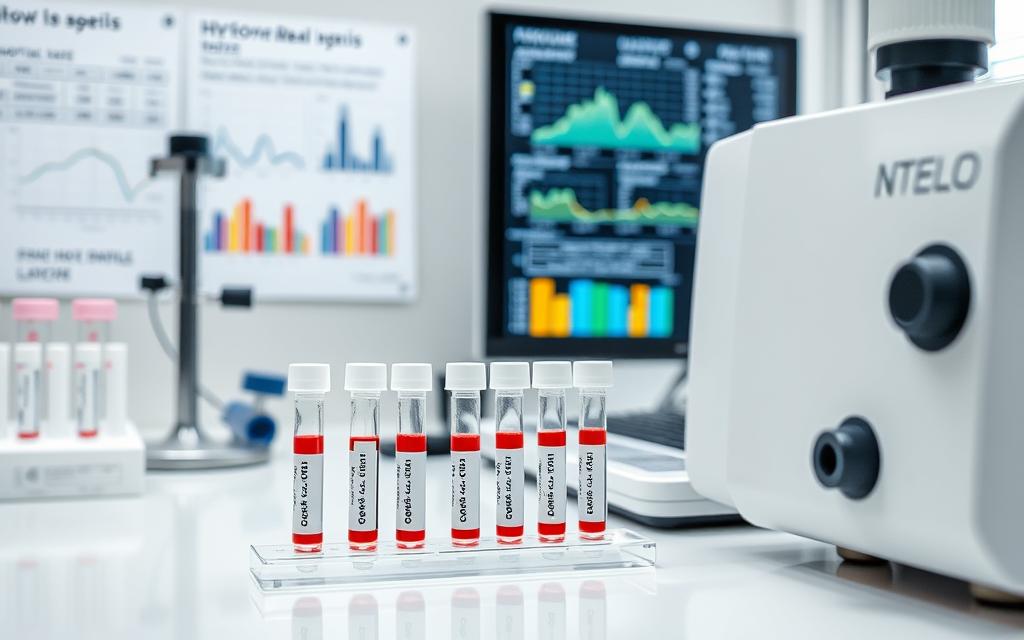Hormones have a big impact on our lives, affecting things like blood sugar and blood pressure. They also influence growth, fertility, sex drive, metabolism, and sleep1. It’s clear that keeping hormones in balance is key to staying healthy and feeling good.
Hormones are like messengers in our body, helping it grow and work right. They are very important for women’s health and keeping everything in balance.
Research shows that about 5% of people during pregnancy have thyroid problems2. This shows how important it is to watch our hormones during big life changes. Women go through more hormonal shifts than men, especially during big times like puberty, pregnancy, and menopause1. Knowing how hormones affect us is crucial for staying healthy.
Key Takeaways
- Hormones play a significant role in women’s wellbeing, affecting various bodily functions.
- Hormonal balance is crucial for maintaining overall health and wellbeing.
- Significant life events, such as pregnancy and menopause, can impact hormonal health.
- Monitoring hormonal health is essential for preventing and managing hormonal imbalances.
- Understanding the impact of hormones on women’s wellbeing is vital for maintaining hormonal balance and overall health.
Understanding the Fundamentals of Female Hormones
Female hormones are key to keeping our bodies in balance. Estrogen, progesterone, and testosterone are the main hormones in women. They are controlled by the endocrine system3. Knowing how these hormones work is vital for staying healthy.
The endocrine system, which includes glands like the thyroid and pituitary, manages hormones4. When there’s too much or too little of a hormone, it can cause problems4. Almost half of all women deal with hormonal imbalances4.
Signs of hormonal imbalance include irregular periods and trouble getting pregnant3. You might also see adult acne, too much hair, or feel tired all the time3. These signs can point to issues like PCOS or obesity3. PCOS affects 6-12% of women, showing how important hormone balance is5.
| Hormone | Function |
|---|---|
| Estrogen | Regulates menstrual cycle and maintains bone density |
| Progesterone | Prepares uterus for pregnancy and maintains pregnancy |
| Testosterone | Regulates libido and maintains muscle mass |
The Complex Web of Hormonal Balance in Women
Exploring women’s health hormones shows us how vital hormonal balance is. It’s about the balance between different hormones in our bodies. Any upset can cause symptoms and health problems. Stress, bad diet, and not exercising enough can mess with hormone levels, causing imbalance6.
Studies say up to 80% of women face hormonal imbalances, especially in their reproductive years7. This can bring on mood swings, weight gain, and irregular periods. Also, it can raise the risk of hormone-related cancers, like breast cancer, by up to 30%6. Eating right and living a healthy lifestyle can help lower this risk and keep hormones in check.
Several things can affect hormonal balance, including:
- Diet and nutrition: Eating whole foods can cut hormone-related symptoms by up to 40%7
- Exercise: Staying active can boost hormone function and lower cancer risk6
- Stress: Ongoing stress can mess with hormone balance and cause anxiety and depression6

By grasping the complex nature of hormonal balance in women, we can work to support it. This can help avoid hormone-related health problems and improve overall health.
| Factor | Impact on Hormonal Balance |
|---|---|
| Diet and Nutrition | Can reduce hormone-related symptoms by up to 40% |
| Exercise | Can improve hormonal function and reduce the risk of hormone-related cancers |
| Stress | Can disrupt hormonal balance and lead to a range of symptoms |
Analyzing the Impact of Hormones on Women’s Wellbeing: A Clinical Perspective
Hormone therapy can greatly affect women’s wellbeing, especially with hormonal changes8. These changes can impact both physical and mental health. It’s important to understand how hormones influence our bodies and minds.
Hormonal shifts can cause physical symptoms like changes in menstrual cycles and fertility8. They can also lead to mood swings, anxiety, and depression8. Hormones play a big role in how we feel and function every day.
Important factors to think about include:
- Physical effects of hormonal changes, such as changes in menstrual cycle and fertility8
- Mental health implications, including mood swings and anxiety8
- Quality of life considerations, such as sleep quality and energy levels8
Dr. Hermann says hormones greatly affect mood and anxiety8. Estrogen acts like an antidepressant in the brain8. Also, thyroid hormone imbalance can cause depression or anxiety8.
Hormone therapy is key in managing hormonal changes and improving women’s health8. Understanding hormonal health helps us create better treatment plans. This way, we can make informed choices about hormone therapy.
Common Signs of Hormonal Imbalance
Knowing the signs of hormonal imbalance is key to keeping your hormonal health in check. About 80% of women see big hormonal changes during their periods9. These changes can cause symptoms like irregular periods, mood swings, and weight changes9.
Some common signs of hormonal imbalance include:
- Irregular periods
- Mood swings
- Weight gain or loss
- Changes in sleep patterns
- Changes in skin, hair, and nail health
- Digestive issues
These symptoms often come from changes in female hormones like estrogen and progesterone. They can really affect a woman’s life quality10.
It’s important to know these signs and see a doctor if they don’t go away. By living a healthy lifestyle and watching your hormone levels, you can help avoid hormonal imbalances. This helps keep your hormonal health in top shape9.

By knowing the signs of hormonal imbalance, women can take charge of their hormonal health. Remember, keeping your hormones balanced is key to staying healthy. Spotting these signs is the first step to better hormonal health10.
| Common Signs of Hormonal Imbalance | Description |
|---|---|
| Irregular periods | Changes in menstrual cycle length or frequency |
| Mood swings | Changes in emotional state, such as anxiety or depression |
| Weight gain or loss | Changes in weight due to hormonal fluctuations |
The Menstrual Cycle’s Role in Hormonal Regulation
The menstrual cycle is key to women’s health hormones and hormone regulation. Knowing how the menstrual cycle works is vital for keeping hormonal balance. It usually lasts 28 days, with two to seven days of menstruation11. Hormones like FSH and LH start and control the cycle11.
The follicular phase happens from day 1 to 14, with rising estrogen levels. The luteal phase, from day 15 to 28, sees rising progesterone levels11. Most cycles are between 24 to 38 days12. But, only 10 to 15% of women have a 28-day cycle12.
At the cycle’s end, if no fertilization, progesterone starts a new cycle11. The average age for first menstruation is 12.4 years13. Normal cycles are 24 to 38 days13. Cycles over 38 days are infrequent, and under 24 are frequent13.

Understanding the menstrual cycle’s role in hormone regulation and hormonal balance helps women manage their health. By seeing the menstrual cycle’s importance, women can improve their overall health and wellbeing.
Life Stages and Hormonal Transitions
Women go through different life stages, each with big hormonal changes14. These changes, like puberty, pregnancy, and menopause, affect their health15. It’s key to know these changes to keep hormones balanced and avoid imbalances.
Some important life stages include:
- Puberty: A time of big hormonal shifts, thanks to estrogen and progesterone15
- Pregnancy: Estrogen and progesterone levels rise to help the baby grow and get ready for birth15
- Menopause: Around age 50, estrogen and progesterone levels drop a lot14
Hormone therapy helps with symptoms during these times15. Knowing how life stages affect hormones helps women stay balanced and avoid health problems.

Hormonal changes can really affect women’s mental health, with up to 70% feeling mood swings during their cycle14. Recognizing this link helps women find the right help and support for their mental health.
| Life Stage | Hormonal Changes | Effects on Health |
|---|---|---|
| Puberty | Estrogen and progesterone increase | Physical and emotional changes |
| Pregnancy | Estrogen and progesterone surge | Supports fetal development and prepares the body for childbirth |
| Menopause | Estrogen and progesterone decrease | May lead to hot flashes, night sweats, and osteoporosis |
Environmental Factors Affecting Hormone Levels
Many things in our environment can affect our hormones. This includes what we eat, how we live, and the toxins we’re exposed to. Eating well, with less sugar and more protein, can help keep hormones in check16. Lifestyle choices, like stress levels, sleep, and exercise, also matter a lot.
Some key factors that can impact hormone levels include:
- Diet and nutrition: Eating too much sugar and refined carbs can cause insulin spikes. This can lead to insulin resistance and affect hormone levels16.
- Lifestyle influences: Too much stress can cause cortisol levels to rise. This can mess with hormones like estrogen and progesterone16.
- Environmental toxins: Exposure to certain chemicals can harm reproductive health in women, especially with conditions like PCOS16.
Knowing how our environment affects hormones helps us make better choices. By eating right, managing stress, and avoiding toxins, we can keep our hormones balanced. This supports our overall health and wellbeing.

It’s important to be mindful of toxins in our environment. Choosing products without harmful chemicals can help protect our hormones16. By controlling our environment and making smart choices, we can support our hormonal health and avoid imbalances.
| Environmental Factor | Impact on Hormone Levels |
|---|---|
| Diet and nutrition | High intake of refined carbs and sugar can lead to insulin resistance and negatively impact hormone levels16 |
| Lifestyle influences | Chronic stress can disrupt reproductive hormones such as estrogen and progesterone16 |
| Environmental toxins | Exposure to EDCs is linked to various reproductive health issues in women, particularly conditions like PCOS16 |
Stress and Its Effects on Hormonal Balance
Stress can really mess with hormone regulation in women, causing imbalances and health problems17. The third source says stress can upset hormone levels. It can also lead to mental health issues like anxiety or depression17. About 50 million women in the U.S. face hormonal imbalances each year. 10% of women of childbearing age have polycystic ovary syndrome (PCOS), a big cause of these imbalances18.
Long-term stress raises cortisol levels, which can up estrogen by about 20%18. This can mess with hormonal health and cause mood swings, irregular periods, and weight gain. Around 75% of women go through menopausal symptoms during perimenopause because of dropping estrogen and progesterone levels18. Knowing how stress affects female hormones helps women find ways to manage stress and avoid hormonal imbalances.
A study found 34% of women with thyroid disorders also have hormonal imbalances18. Not getting enough essential fatty acids can cut sex hormone production by up to 50%18. Also, 25% of women on a high-sugar diet are more likely to get insulin resistance, affecting hormonal health18. By managing stress and living healthily, women can help their hormone regulation and overall health.

Women need to know the signs of hormonal imbalance, like heavy or frequent periods, stopped or missed periods, hair loss, and weight gain17. By spotting these signs and managing stress, women can lower their risk of health problems and keep their hormonal health in check.
| Symptoms of Hormonal Imbalance | Description |
|---|---|
| Heavy or frequent periods | Abnormal uterine bleeding |
| Stopped or missed periods | Amenorrhea or oligomenorrhea |
| Hair loss | Alopecia or excessive hair shedding |
| Weight gain | Unintentional weight gain or difficulty losing weight |
Modern Medical Approaches to Hormone Testing
Knowing your hormone levels is key for women’s health. Hormonal changes can greatly affect how you feel. Hormone therapy can help, but you need to know what’s wrong first. Dr. Katz says lab tests can check hormone levels, but it’s more about how they make you feel19.
There are many ways to test hormones, like blood, saliva, and urine tests. Blood tests are most common and very accurate, over 90%19. Saliva and urine tests are easier and don’t hurt. Knowing your hormone levels helps you stay healthy and can even improve fertility19.
Hormonal imbalances can cause many problems, like irregular periods, mood swings, and weight changes19. Testing early can help fix these issues. This way, women can choose the best treatments for themselves, like hormone therapy19.

Other tests like saliva and urine can also give important info about hormone changes20. Many women stop using hormone-based birth control because of side effects20. This shows the importance of managing hormones well and finding the right treatments.
Natural Methods for Supporting Hormonal Health
Keeping hormonal health in check is key for feeling good, especially for women. Eating right, with less sugar and refined carbs, and more protein and omega-3s, helps balance hormone levels21. Also, staying active, managing stress, and getting enough sleep are vital for hormonal balance22.
Here are some natural ways to support hormonal health:
- Eat a balanced diet with vitamins like D, magnesium, and B vitamins21
- Stay active to make hormone receptors work better22
- Use stress management to lower cortisol levels23
By adding these natural methods to your life, women can actively support their hormonal health. This can help avoid hormonal imbalance22. Always talk to a healthcare expert before changing your diet or exercise routine.
The Role of Exercise in Hormone Regulation
Exercise is key for keeping women’s health hormones in check and for overall hormonal balance. It helps lower stress, boosts mood, and keeps hormone levels steady24. Dr. Hermann says that mood and anxiety issues linked to hormones are often stress-related. Exercise can help ease these problems.
For the best hormone regulation, consider these exercise benefits:
- Cardio boosts dopamine and sleep quality24
- Strength training increases testosterone and muscle24
- Timing is key, with at least 30 minutes of heart rate activity daily24
Research links physical activity to a 25% lower breast cancer risk in women25. Exercise also affects estrogen levels, easing menopause symptoms24. By exercising regularly, women can actively support their hormonal balance and health.
Nutrition’s Impact on Hormonal Balance
Nutrition is key to keeping hormonal health in check. A diet low in sugar and refined carbs and high in protein and omega-3s helps balance hormone levels26. Research shows that bad diet choices can mess with hormone production, causing imbalance26.
Eating a balanced diet is crucial for hormonal equilibrium and reproductive health27. Foods like omega-3s, vitamin D, and magnesium are good for female hormones28. But, eating too much-processed food can cause health problems like diabetes and heart disease28. A diet full of whole foods, fruits, and veggies helps keep hormone levels in check26.
To keep hormonal health in balance, eat well and live healthy. This means eating a variety of whole foods, drinking plenty of water, and exercising27. Making smart diet and lifestyle choices helps regulate hormone levels and supports hormonal health26.
Sleep Quality and Hormonal Health Connection
Sleep quality is closely linked to hormonal health. It’s key to understand this connection for hormonal balance. We spend about one third of our lives asleep29. Lack of sleep can raise stress hormone levels by 30%29, affecting hormone regulation.
Women are 40% more likely to have insomnia than men29. So, improving sleep quality is vital for hormonal health.
Improving sleep quality for hormonal balance involves several steps:
- Establishing a consistent sleep schedule
- Creating a relaxing sleep environment
- Avoiding caffeine and alcohol before bedtime
Mindfulness practices can also help. They can lower stress hormones like cortisol and adrenaline, leading to better sleep29. By focusing on sleep quality, women can support their hormonal health and wellbeing.
Sleep disturbances, like insomnia, can signal hormonal imbalance. Women are 41% more likely to have insomnia than men30. Understanding the link between sleep and hormones helps women improve sleep and balance hormones. This supports their female hormones and overall health.
Treatment Options and Medical Interventions
Women’s hormones are key in finding the right treatment for hormonal imbalances. Dr. Katz says treatments include medication, hormone therapy, and lifestyle changes31. Each treatment is tailored to the individual, as there’s no one-size-fits-all solution. Hormone therapy is especially helpful for menopausal hot flashes, especially when started early32.
Some women choose hormone replacement therapy (HRT) for menopausal symptoms like hot flashes and vaginal discomfort31. But, HRT can also increase the risk of heart disease, stroke, blood clots, and breast cancer31. Estrogen therapy is best for those with severe hot flashes and helps prevent bone loss31.
Other options include non-hormonal meds like SSRIs and SNRIs for hot flashes, especially for those who can’t take estrogen32. Lifestyle changes like exercise and weight management can also help32. It’s important for women to talk to their doctor about their health history and needs to find the best treatment33.
The main goal of treatment is to ease symptoms and improve life quality. By knowing the different treatments, women can make better choices for their hormonal health31. Regular health checks and screenings, like mammograms, are key for those on hormone therapy31. Working with their healthcare provider, women can find the right balance and manage their hormonal health.
Long-term Strategies for Maintaining Hormonal Health
Women need to focus on long-term strategies to keep their hormonal health in check. A balanced diet with 25–30 grams of protein per meal is key for hormone levels34. Regular exercise, like cardio, strength training, and flexibility, also helps balance hormones35.
Getting 7-9 hours of quality sleep each night is crucial for hormonal regulation and health35. Drinking at least eight glasses of water daily and limiting alcohol and caffeine can also help keep hormonal balance35. These steps can lower the risk of hormonal imbalance and diseases like diabetes and heart disease34.
Here are some important tips for hormonal health:
* Eat a balanced diet with fruits, veggies, whole grains, and lean proteins
* Stay away from processed foods and sugary snacks
* Do at least 30 minutes of exercise, like walking or jogging, every day
* Get enough sleep and try stress-reducing activities like meditation or yoga
By following these tips and living a healthy lifestyle, women can support their hormonal health and avoid health problems35.
Conclusion: Empowering Women Through Hormonal Understanding
Understanding the complex web of36 women’s hormonal balance is key to empowering them. By knowing how hormones affect their health, women can manage their hormones better. This helps prevent health problems36.
With knowledge about hormones, women can make better choices. This includes what they eat36, how much they exercise36, how they handle stress36, and how well they sleep36. This proactive approach lowers the risk of hormonal imbalances36. It also lets women take charge of their health36.
Understanding hormonal health empowers women to care for themselves. This leads to a better quality of life and more resilience36. It’s important for women to thrive in all aspects of life36.
FAQ
What are the key hormones in women’s bodies?
Women’s bodies have several key hormones. These include estrogen, progesterone, testosterone, thyroid hormones, insulin, and cortisol. Each hormone has a specific role. They work together to keep the body’s systems in balance.
What is the role of the endocrine system in hormone regulation?
The endocrine system, with glands like the thyroid and pituitary, makes and controls hormones. Knowing how hormones work is key. They help with growth, development, and metabolism.
What is hormonal balance and why is it important for women’s wellbeing?
Hormonal balance means all hormones in the body work together well. When they don’t, it can cause many problems. Keeping hormones balanced is vital for women’s health and happiness.
What are the common signs of hormonal imbalance in women?
Signs of hormonal imbalance include irregular periods and mood swings. Other signs are weight changes, sleep issues, and changes in skin, hair, and nails. Digestive problems can also occur.
How does the menstrual cycle affect hormonal regulation?
The menstrual cycle is key for hormone balance. Estrogen levels rise in the follicular phase. Progesterone levels increase in the luteal phase. These changes can affect mood, energy, and overall health.
How do life stages, such as puberty, pregnancy, and menopause, impact hormonal health?
Hormones change a lot throughout a woman’s life. Puberty, pregnancy, and menopause bring big hormonal shifts. These changes can affect health and wellbeing.
How do environmental factors, such as diet, lifestyle, and toxins, impact hormone levels?
Diet, lifestyle, and toxins can change hormone levels. Eating well, living healthily, and avoiding harmful chemicals can help keep hormones balanced.
What is the connection between stress and hormonal balance?
Stress can really affect hormone balance. Too much stress can mess with hormone production. This can lead to health issues, like anxiety or depression.
What are the common methods for testing hormone levels?
To test hormone levels, people often use blood tests, saliva tests, or urine analysis. Each method has its own benefits and drawbacks. Knowing these can help women choose the best option for them.
What are the natural methods for supporting hormonal health?
Natural ways to support hormonal health include eating well, exercising, managing stress, and getting enough sleep. These actions can help keep hormones in balance.
How does exercise impact hormone regulation?
Exercise is very important for hormone balance. Different types of exercise, like cardio and strength training, can help keep hormones balanced.
What is the impact of nutrition on hormonal balance?
Nutrition is very important for hormone balance. Eating foods low in sugar and refined carbs and high in protein and omega-3s can help regulate hormones.
How does sleep quality affect hormonal health?
Sleep quality is very important for hormone health. The body’s natural rhythm and sleep disorders can affect hormone balance. Improving sleep quality is key for hormonal health.
What are the treatment options and medical interventions for hormonal imbalance?
Treatment for hormonal imbalance includes medicine, hormone therapy, and lifestyle changes. Finding the right treatment is important. Women should work with their doctors to find the best plan.
What are the long-term strategies for maintaining hormonal health?
Long-term strategies for hormonal health include a healthy lifestyle. This includes a balanced diet, regular exercise, and enough sleep. Understanding these factors and making plans can help women support their hormonal health over time.
Source Links
- Hormones’ Role on Our Health, and Wellness – https://weillcornell.org/news/hormones’-role-on-our-health-and-wellness
- Here’s what a change in hormones can mean for women’s health – https://www.singlecare.com/blog/female-hormones-and-mental-health/
- What You Need To Know About Female Hormones | Haney GYN – https://haneygyn.com/gynecology/what-you-need-to-know-about-female-hormones/
- Women’s Hormones 101: How Much They Affect Us – https://www.avantgynecology.com/2019/10/30/womens-hormones-101-how-much-they-affect-us/
- Role of Hormones: Their Influence on Women’s Health – https://creeksideobgyn.com/role-of-hormones-and-womens-health/
- Functional Medicine for Women’s Health: Balancing Hormones Naturally – https://rhealthc.com/functional-medicine/functional-medicine-for-womens-health-balancing-hormones-naturally/
- Women’s Hormone Health in Birmingham, AL | OB/GYN – https://obgynal.com/navigating-female-hormone-health-a-comprehensive-guide-for-well-being/
- Effects of Hormone Therapy on Cognition and Mood – https://pmc.ncbi.nlm.nih.gov/articles/PMC4330961/
- 7 signs of a hormonal imbalance — and what to do about it – https://www.uclahealth.org/news/article/7-signs-hormonal-imbalance-and-what-do-about-it
- 9 Signs Your Hormones Are Out of Whack – https://www.templehealth.org/about/blog/signs-your-hormones-are-out-of-whack
- The Role of Hormones in the Menstrual Cycle – West Suburban Medical Center – https://www.westsuburbanmc.com/the-role-of-hormones-in-the-menstrual-cycle/
- Menstrual Cycle – Women’s Health Issues – Merck Manual Consumer Version – https://www.merckmanuals.com/home/women-s-health-issues/biology-of-the-female-reproductive-system/menstrual-cycle
- Physiology, Menstrual Cycle – StatPearls – https://www.ncbi.nlm.nih.gov/books/NBK500020/
- Women’s health Women’s life stages – https://www.mayoclinic.org/healthy-lifestyle/womens-health/basics/womens-life-stages/hlv-20049411
- How Do Hormones Impact a Woman’s Health Throughout Her Life? – https://mogamd.com/how-do-hormones-impact-a-womans-health-throughout-her-life/
- Could Your Lifestyle and Environment Be Disrupting Your Hormones? – https://coyleinstitute.com/habits-affect-hormones/
- The Connection Between Stress & Your Hormones – Capital Women’s Care of Rockville – https://rockvilleobgyn.com/blog/the-connection-between-stress-your-hormones/
- The Impact of Hormonal Imbalances on Women’s Health: Identification and Management – https://hera-health.com/impact-of-hormonal-imbalances/
- Hormone Testing for Women: Take Control of Your Health – https://www.harleyhealthcentre.com/blog/womens-health/hormone-testing-for-women-taking-control-of-your-health-and-hormonal-balance
- Women’s health, hormonal balance, and personal autonomy – https://pmc.ncbi.nlm.nih.gov/articles/PMC10347535/
- Ways to Support Female’s Hormones Through Nutrition – Recreational Services – https://recreation.gsu.edu/2023/09/28/ways-to-support-females-hormones-through-nutrition/
- How to Balance Hormones – Women For Women OBGYN – https://women4womenobgyn.com/how-to-balance-hormones
- How to balance hormones naturally: 10 ways – https://www.medicalnewstoday.com/articles/324031
- Here Are Ways Exercise Helps Balance Hormones – https://www.piedmont.org/living-real-change/how-exercise-helps-balance-hormones
- Effect of physical activity on sex hormones in women: a systematic review and meta-analysis of randomized controlled trials – https://pmc.ncbi.nlm.nih.gov/articles/PMC4635995/
- What Role Does Nutrition Play in Women’s Health and Well-being? – https://whsobgyn.com/what-role-does-nutrition-play-in-womens-health-and-well-being/
- How the intricate relationship between nutrition and hormonal equilibrium significantly influences endocrine and reproductive health in adolescent girls – https://pmc.ncbi.nlm.nih.gov/articles/PMC10973102/
- The Role of Nutrition in Hormonal Balance – https://asktia.com/article/the-role-of-nutrition-in-hormonal-balance
- How Women’s Hormones Can Affect Their Sleep – And Tips for Improving It! – https://vpfw.com/blog/how-womens-hormones-can-affect-their-sleep-and-tips-for-improving-it/
- Neurobiological and Hormonal Mechanisms Regulating Women’s Sleep – https://pmc.ncbi.nlm.nih.gov/articles/PMC7840832/
- Comparing the risks and benefits of hormone therapy – https://www.mayoclinic.org/diseases-conditions/menopause/in-depth/hormone-therapy/art-20046372
- Menopause – Diagnosis and treatment – https://www.mayoclinic.org/diseases-conditions/menopause/diagnosis-treatment/drc-20353401
- Menopause treatment | Office on Women’s Health – https://womenshealth.gov/menopause/menopause-treatment
- How To Balance Your Hormones Naturally – https://www.healthline.com/nutrition/balance-hormones
- Tips for Balancing Hormones and Wellness for Women Over 40 – Albuquerque Total Health – https://www.albuquerquetotalhealth.com/tips-for-balancing-hormones-and-wellness-for-women-over-40/
- The Importance of Hormone Balance for Womens Health | Dr. Asmita Dongare – https://www.drasmitadongare.com/the-importance-of-hormone-balance-for-womens-health/
